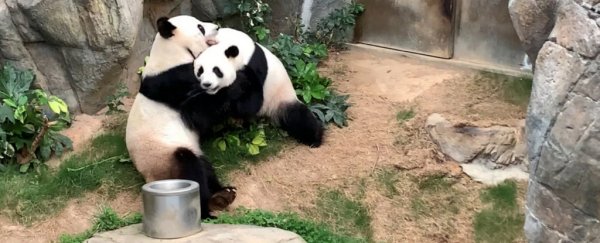If the world wants more pandas to 'get it on', perhaps all we humans need to do is get out the way.
Far from the prying eyes of the public, two captive giant pandas in a closed Hong Kong zoo are making up for lost time with a whole lotta boning. Well, not a whole lot. Just once, but for this particular couple that's something to celebrate.
In the 10 years Ying Ying and Le Le have known each other, they've never once gotten down and dirty. And yet, this breeding season, amid a global pandemic, something between them seemed to change.
In late March, after a month or so of unusual privacy, Ying Ying began spending more time in the water. Meanwhile, Le Le began leaving a trail of scents around his habitat, actively searching for his companion's smell all the while. On Monday the two were seen cuddling. Love was clearly in the air.
At 9am, the deed was done and dusted, according to zoo officials.
Giant pandas Ying Ying and Le Le succeeded in a natural mating, @Ocean_Park has announced. "We hope to bear wonderful pregnancy news to Hong Kongers this year and make further contributions to the conservation of this vulnerable species," the park's Michael Boos said. pic.twitter.com/yJCpCdVHeK
— Hong Kong Free Press HKFP (@hkfp) April 6, 2020
"The successful natural mating process today is extremely exciting for all of us, as the chance of pregnancy via natural mating is higher than by artificial insemination," said spokesperson from Ocean Park zoo Michael Boos in a recent statement.
While it's still not clear if a youngster is actually on the way, officials at the zoo are elated and are watching closely for signs of pregnancy, which, they say, could show up as early as late June.
"We hope to bear wonderful pregnancy news to Hong Kongers this year and make further contributions to the conservation of this vulnerable species," said Boos.
Nevertheless, the zoo made no mention of the coincidental timing, only that the pandas had clearly learned to copulate after years upon years of "trial".
So is this a sign we should leave pandas alone more if we want them to procreate in future?
Despite their reputation, zoologists have long argued pandas don't actually have as low a sex drive in the wild as they show in captivity; they're actually quite frisky beings.
"It is a phoney issue to say that pandas face a breeding crisis that we have to solve," Jim Harkness, a panda expert and the former China representative for the World Wide Fund for Nature, told The Guardian back in 2006.
Some experts argue that to save this vulnerable species may not be human breeding programs but rather preservation of their natural habitat where they might actually reproduce better.
What we do know is that, each spring, female pandas enter heat for one to three days, and that's the only window in which the male panda has to act. These are difficult circumstances to begin with, and perhaps our presence might be making them even trickier.
As the current global pandemic heats up, so has Ying Ying and Le Le's affair, and if that's more than just a coincidence, it's important to know. Giant pandas are currently considered a vulnerable species having already lost the vast majority of their habitat.
